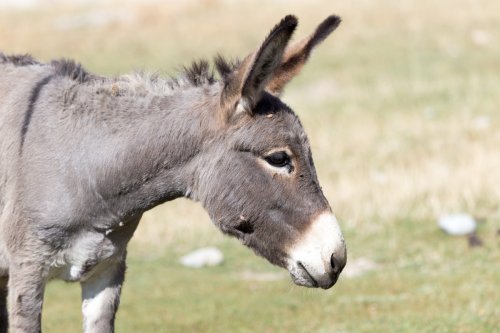
When Jesus entered Jerusalem on Palm Sunday, people laid their robes and palm branches on the street before the Lord, proclaiming “Hosanna! Blessed is He who comes in the name of the Lord, indeed, the King of Israel!” (John 12:13).
But why did Christ ride in on a donkey?
It was a prophetic act.
The Apostle John wrote that Jesus told His disciples where they could seek out a donkey colt for the Lord’s final journey into Jerusalem (John 12:13-16).
In this passage, John referred to a prophecy in Zechariah, where the prophet proclaimed that there would be a new King over Israel, the Messiah, who would enter riding a donkey:
Rejoice greatly, Daughter Zion!
Shout, Daughter Jerusalem!
See, your king comes to you,
righteous and victorious,
lowly and riding on a donkey,
on a colt, the foal of a donkey. (Zechariah 9:9 NIV)
Donkeys or mules, the interbreeding of a horse and donkey, were often associated with royalty in ancient Israel. During times of peace, kings typically rode donkeys or mules, so they wouldn’t instill fear into a population.
As John explains, “Fear not, daughter of Zion; behold, your king is coming, sitting on a donkey’s colt!” (John 12:15).
Having just come through a bloody civil war with Absalom, in 1 Kings 1:33, King David did just that when he had his son Solomon ride one of David’s royal mules into Jerusalem to signify his ‘peaceful’ claim to the throne.
However, during times of war or rebellion, the kings rode a warhorse or in a chariot, as Jehu did when he dispatched King Ahaziah of Judah and Israel’s King Joram (2 Kings 9:14-29), and as well Jezebel (2 Kings 9:30-37).
Because Jehu came in a chariot, the choice of ride immediately concerned King Joram, and he asked, “Have you come in peace, Jehu?” (2 Kings 9:21-23).
But as we discuss Zechariah 9:9, we often overlook the very next verse:
I will cut off the chariot from Ephraim
and the war horse from Jerusalem;
and the battle bow shall be cut off,
and he shall speak peace to the nations;
his rule shall be from sea to sea,
and from the River to the ends of the earth. (Zechariah 9:10 ESV)
In verse 10, we read that because Jesus was coming “to speak peace to the nations“, the Lord rode a donkey.
Notice how Zechariah also explains that His kingdom or rule will extend “from sea to see and from the rivers to the end of the earth“.
This is no longer talking about the physical nation of Israel, but the dramatic change that would come after Jesus’s resurrection and the Holy Spirit fell.
God’s kingdom will break free from the borders of national Israel and spread to every kingdom of the world, through the church, the Israel of God (Galatians 6:16).
Originally posted April 11, 2022.

That was a very good job of explanation.
Woodrow Nichols
antinomianuniversalism.com
LikeLike
Pingback: Stones of Remembrance 6: Abraham’s 5th Altar | mrshlovesjesus